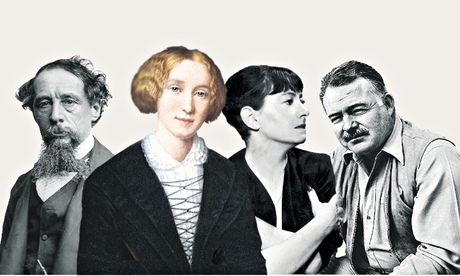The English language didn't just spring from nowhere. So who introduced such gems as cojones, meme, nerd and butterfingers?

Wordsmiths: Charles Dickens, George Eliot, Dorothy Parker and Ernest Hemingway are all the surprising sources of some of our everyday words. Photograph: Getty Images/Alamy/Sportsphoto Ltd - Allstar/Guardian montage
Butterfingers
Charles Dickens used the term in his 1836 The Pickwick Papers (more properly called The Posthumous Papers of the Pickwick Club): "At every bad attempt at a catch, and every failure to stop the ball, he launched his personal displeasure at the head of the devoted individual in such denunciations as 'Ah, ah!—stupid'—'Now, butter-fingers'—'Muff'— 'Humbug'—and so forth."Chintzy
Originally this word meant to be decorated or covered with chintz, a calico print from India, or suggestive of a pattern in chintz. It was extended to mean unfashionable, cheap or stingy, coming from none other than Mary Ann Evans, better known by her pen name George Eliot, who wrote in a letter in 1851: "The effect is chintzy and would be unbecoming."Chortle
Blend of "chuckle" and "snort", created by Lewis Carroll in Through the Looking-Glass: "'O frabjous day! Callooh! Callay!' He chortled in his joy." Carroll also coined the term "portmanteau word", for merging two existing words into one new word. In such blending, parts of two familiar words are yoked together (usually the first part of one word and the second part of the other) to produce a word that conveys the meanings and sound of the old ones – smog from "smoke" + "fog", and brunch from "breakfast" + "lunch". Portmanteau itself is a quaint word for suitcase, originally combining the French porter (to carry) and manteau (cloak) to make a name for a cloak-transporting suitcase designed for carrying on horseback. Lexicographer Ben Zimmer has noted that the portmanteau "remains perhaps the most popular method of new word formation in English, from slang ('chillax', 'geektastic') to business jargon ('webinar,' 'advertorial')".More
No comments:
Post a Comment